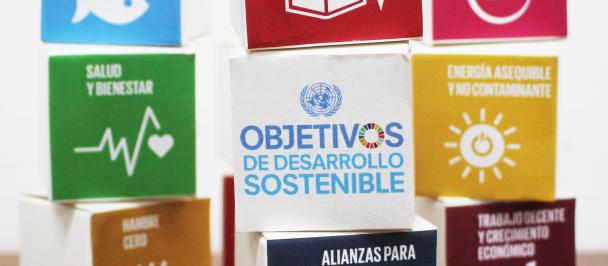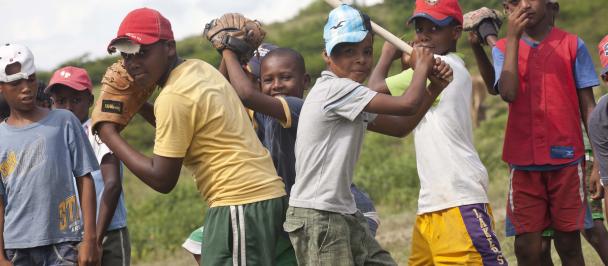Contours of the national platform for sustainability in the Dominican Republic
Hitting home runs for the SDGs
April 17, 2018
In baseball, a home run happens when a batter hits a fair ball, makes a complete circuit of the bases and scores on a run, often allowing other on-base players to score runs as well. This very popular game, known as ‘pelota’ in the Dominican Republic, has many similarities to public policies that attack difficult development problems: they also require strategy, vision, teamwork, coordination and, of course, home runs.
Like the passion for ‘pelota’, this national sport that is quintessential to the Dominican identity, at UNDP we deliver platforms and systems to achieve sustainable development, or, in baseball terms, to "score runs" vis-à-vis the 2030 Agenda and the Sustainable Development Goals (SDGs).
In our new Strategic Plan (2018-2022), we have conceived "country support platforms" to help nations design and offer integrated solutions to complex development problems. The design of these platforms entails articulations, resources, and consensus building with sectors, key persons and decision makers in the economic, social and environmental areas, and all their intersections. But, above all, it requires interpreting and knowing how to check the pulse of the countries, those specificities that define them and that, consequently, will influence the type of interventions and policies that are effective to accelerate SDG achievements.
Here are a few key lessons on shaping this platform in the Dominican Republic:
- Working hand in hand with government: the “catcher” of the 2030 Agenda is indisputably the Government of the Dominican Republic. With the creation of a High Level Inter-Institutional Commission for Sustainable Development, an intersectoral space was created to guide national and sub-national actions to implement the 2030 Agenda, following commitments made at the 2015 Summit. In a key alliance with the Ministry of Economy, Planning and Development (MEPyD), we accompany the design of national strategies and assessments.
- Moving the SDGs from paper to practice: Through the MAPS approach, we are supporting the Dominican Republic to translate the Goals into plans and budgets, raise public awareness and establish practices for monitoring and reporting (Mainstreaming – the ‘M’ of MAPS); identify actions that will boost progress across several SDGs (Acceleration – the ‘A’ of MAPS); and provide thematic policy support (the ‘P’).
- Landing the SDGs locally: In a country of 19,000 square miles and a unitary presidential system, the demands for an adequate land use planning and effective management of local governance are urgent needs in this Agenda. Through partnerships with municipal actors we work to focus the SDGs by implementing municipal assessments and working with the actors on the ground based on the realities of each corner of the country.
- Integrated platforms for SDG monitoring: The public policy agenda and national development priorities are reflected in the government’s plan and presidential goals, whose monitoring is supported by UNDP’s Information and Management System for Democratic Governance (also known as SIGOB). We are pushing the envelope to ‘tag’ presidential goals and its budget investments with the SDGs to ensure political buy-in in decision-making processes.
- Bringing all partners and sectors on board: Aligning the SDGs with the national development plan has only been the first step. Now, the more granular work with the private sector, civil society and academia is conceiving integral initiatives that combine multiple goals and indicators (combo). With specific training offered to public servants and NGO practitioners on the combo methodology, we encourage the adoption of comprehensive policies to help achieve the SDGs.
- Monitoring, reporting, verifying: Working with timely data is an imperative in this Agenda. In a strategic alliance with the MEPyD and the National Bureau of Statistics, UNDP co-designed the SDG Portal, providing support for the development of data sheets and metadata. We also helped in the design of the first SDG Lab to innovate in data generation. In 2018, the Dominican Republic will present its first National Voluntary Report, supported by UNDP, at the High Level Political Forum.
- Sowing change to change the Agenda: UNDP promotes partnerships at all levels and across sectors to change the conversation. With Agents of Change we provide instruments for local NGOs to design high impact social projects; with Media for the 2030 Agenda we work with communicators and journalists to contribute to the quality of news related to the 2030 Agenda. Through inter-agency initiatives, we train SDG Promoters to multiply the message, and with Academy 2030 we work with Dominican universities to transform curricula and research and development resources.
- Collaborating and coordinating with the United Nations System (UNS): To achieve the Goals, we have to do things differently, not least the UN. A transformative Agenda requires the UN to act in an equally transformative way. Business as usual is not an option. Through the Inter-Agency Coordination SDG Mechanism, coordinated by UNDP, the Country Team promotes inter-agency initiatives to address challenges in a coordinated manner. Several agencies, funds and programmes promote instruments and analyses, such as roadmaps (e.g. the World Food Programme and the Food and Agriculture Organization for SDG 2), intervention strategies for novel metrics (the International Organization for Migration on migration governance indices), to name a few.
Just as players start their training from an early age, achieving the SDGs requires a transformation of the development paradigm. Eradicating multidimensional poverty and promoting a model of sustainable, transformative development will require investments in human capital, territories and interventions to tackle hard and persistent exclusions.
Welcome to the SDG "field"!

 Locations
Locations


